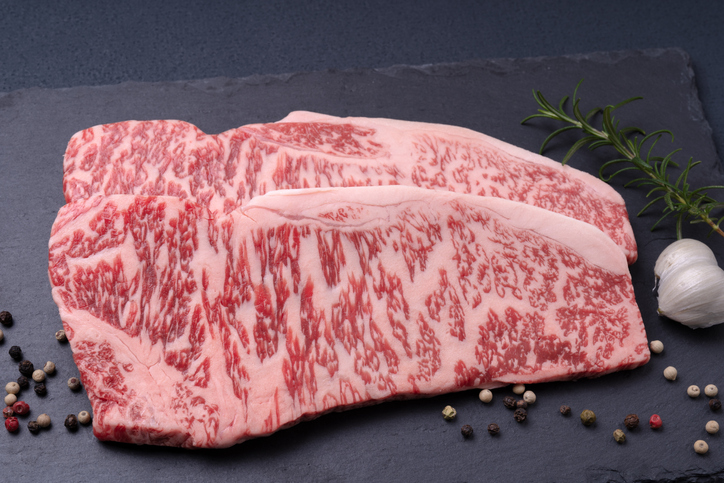Any steak enthusiast will tell you the highest quality steak is a Wagyu steak. Not only is it coveted for being a first-rate steak, but also for its limited supply – you certainly won’t find it at any steak house! Naturally, because of these factors, it drives up its value and is quite expensive. However, it does beg the question: Is Wagyu steak worth it? See whether it’s worth giving a shot by understanding what Wagyu steak is all about!
What is Wagyu Steak?
Wagyu steak originates from a Japanese beef cattle breed derived from cattle native to Asia. So, it’s unsurprising that Wagyu translates to ‘Japanese cow.’ There are four Japanese breeds of beef cattle that are classified as Wagyu.
These include the following:
- Japanese Black: This breed is the most common since they comprise 90% of all fattened cattle in Japan. Despite that, various strains of this breed include Tottori, Tajima, Shimane and Okayama.
- Japanese Brown: Another common breed, this is also known as Japanese Red. The strains from this breed include Kochi and Kumamoto.
- Japanese Shorthorn: This breed makes up less than one percent of all cattle in Japan. Why? Compared to other Wagyu breeds, this one has the least marbling.
- Japanese Polled: As a critically endangered species, this breed isn’t consumed as it once was. There are conservation efforts made to help increase their numbers.
All these Wagyu cattle breeds stem from the early twentieth century of native Japanese cattle with imported stock – mainly from Europe. Yet, the exception is the Japanese Polled since its foreign influence came from Scottish Angus breeds.
From their cross-breeding origins, it resulted in physiology that handles endurance well. That’s why they were initially trained for work. However, this endurance wouldn’t be possible without them having more intramuscular fat cells. Known also as ‘marbling,’ this gives these cattle a readily available energy source – along with their melt-in-your-mouth tenderness and taste!
What Makes Wagyu Great?
As mentioned earlier, Wagyu is expensive because of its limited supply and high-quality flavour. Yet, there is a reason that’s the case. Certain factors contribute to this that further explain its value.
See what they are down below.
Strict Regulations
The Japanese government strictly controls and regulates all Wagyu production to uphold quality standards. These standards are maintained by performing genetic testing to determine if the Wagyu meat meets the criteria for yield and quality. Yield is attributed to the amount of beef an animal provides in relation to its carcass. For yield, they measure this using an A to C scoring system – with A being the highest yield. As for quality, it’s determined by checking for the firmness, texture, colour, and marbling of the meat. Quality is measured from a scoring system from one to five – with five being the highest. When you combine these rating systems to get certified for sale, Wagyu needs to score A3 or higher. Naturally, the higher the score, the higher the price for Wagyu.
Better Care Standards
Beyond having strict regulations, Japan ensures higher quality by providing the best care possible for Wagyu cattle. So, how do they accomplish that? Specifically, it stems from ensuring they get the best diet and environment. Regarding diet, Wagyu cattle are fed an expensive high-energy feed consisting of rice, wheat, and hay. Not only that, they consider how long they’re fed and are mindful of stages of development to further help with marbling. Compared to other cattle, Wagyu cattle are fed twice as long and are done so within a three-year timespan. They take this approach since it takes around 28 to 36 months for Wagyu cattle to develop that intense muscle marbling. Also, they’re hand-fed milk replacement until they’re about ten months old to help promote more marbling. Meanwhile, they provide better living conditions to these cattle by giving them plenty of pasture to graze on. In the winter, calves are dressed in warm jackets to protect them from the cold.
Based on the genetics and standards implemented in Wagyu cattle, there is no denying its value and the driving demand for its meat. From it, all the effort ensures a high-quality steak unlike any other you’ve tasted – making it worth at least trying once despite the high price. After all, experiencing a delicacy such as this is priceless.
